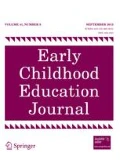Abstract
Sixteen Minnesota families with children with disabilities participated in a 2-year interview study of their care experiences. Findings show that families developed a network of care providers, struggled to pay additional costs for care, were not informed of community services and programs, and believed that their children received adequate child care. This study highlights the need to provide information to families and providers and to link services in both rural and urban communities.
Similar content being viewed by others
Notes
This study is part of the Minnesota Child Care Policy Research Partnership. Funding for the Partnership is made possible by a grant from the U.S. Department of Health and Human Services, Child Care Bureau (Project Number 90YE0010) with additional support from the Minnesota Department of Human Services. This manuscript does not necessarily reflect the views and opinions of the Child Care Bureau or the Minnesota Department of Human Services.
The authors will refer to families’ child care usage versus child care choice because in most cases the parents participating in this study had few child care choices. As Wagner (2007) states, the child care arrangements families use are often utilized because there are limited options available. The different types of child care arrangements may prompt some parents to think that there are many quality options available to them when choosing care for their young children. This is not necessarily the case.
References
Booth, C., & Kelly, F. (1998). Child-care characteristics of infants with and without special needs: Comparisons and concerns. Early Childhood Research Quarterly, 13, 603–621. doi:10.1016/S0885-2006(99)80063-5.
Booth, C., Owen, M. T., McCartney, K., Vandell, D. L., & Clarke-Stewart, K. A. (2002). Child care usage and mother-infant “quality time”. Journal of Marriage and the Family, 64(1), 16–26.
Booth-LaForce, C., & Kelly, F. (2004). Childcare patterns and issues for families of preschool children with disabilities. Infants and Young Children, 17(1), 5–16.
Buell, M. J., Gamel-McCormick, M., & Hallam, R. A. (1999). Inclusion in a childcare context: Experiences and attitudes of family childcare providers. Topics in Early Childhood Special Education, 19, 217–223. doi:10.1177/027112149901900402.
Cost, Q., & Child Quality Outcomes Study Team. (1995). Cost, quality, and child outcomes in child care centers: Key findings and recommendations. Young Children, 50(4), 40–44.
Cryer, D., Tietze, W., & Wessels, H. (2002). Parents’ perceptions of their children’s child care: A cross-national comparison. Early Childhood Research Quarterly, 17, 259–277. doi:10.1016/S0885-2006(02)00148-5.
Denzin, D. (2000). The practices and politics of interpretation. In N. Denzin & Y. Lincoln (Eds.), Handbook of qualitative research (pp. 897–922). Thousand Oaks, CA: Sage.
Devore, S., & Bowers, B. (2006). Childcare for children with disabilities: Families search for specialized care and cooperative childcare partnerships. Infants and Young Children, 19(3), 203–212.
Dinnebeil, L., McInerney, J., Fox, C., & Juchartz-Pendry, K. (1998). An analysis of the perceptions and characteristics of childcare personnel regarding inclusion of young children with special needs in community-based programs. Topics in Early Childhood Special Education, 18, 118–128.
Draper, A. (2004). Workshop on ‘developing qualitative research method skills: analysing and applying your results’. The principles and application of qualitative research. Proceedings of the Nutrition Society, 63, 641–646.
Hillebrand, B., Kok, R., & Biemans, W. (2001). Theory-testing using case studies: A comment on Johnston, Leach, and Liu. Industrial Marketing Management, 30(8), 651–657. doi:10.1016/S0019-8501(00)00115-2.
King Teleki, J., & Buck-Gomez, S. (2004). Child care and early educators’ satisfaction with services among rural families. Early Childhood Education Journal, 29(3), 161–166. doi:10.1023/A:1014532524941.
Knoche, L., Peterson, C. A., Edwards, C. P., & Jeon, H. J. (2006). Childcare for children with and without disabilities: The provider, observer, and parent perspectives. Early Childhood Research Quarterly, 21, 93–109. doi:10.1016/j.ecresq.2006.01.001.
Landis, L. (1992). Marital, employment, and childcare status of mothers with infants and toddlers with disabilities. Topics in Early Childhood Special Education, 12(4), 496–508.
Lawerence-Lightfoot, S., & Davis, J. (1997). The art and science of portraiture. San Francisco: Jossey-Bass.
Parish, S., Cloud, J., Hennig, A. N., & Huh, J. (2005). Childcare, disability, and family structure: Use and quality in a population-based sample of low-income preschool children. Children and Youth Services Review, 27, 905–919. doi:10.1016/j.childyouth.2004.12.007.
Phillips, D., Mekos, D., Starr, S., McCartney, K., & Abbott-Shim, M. (2000). Within and beyond the classroom door: Assessing quality in childcare centers. Early Childhood Research Quarterly, 15(4), 475–496. doi:10.1016/S0885-2006(01)00077-1.
Shearn, J., & Todd, S. (2000). Maternal employment and family responsibilities. Journal of Applied Research in Intellectual Disabilities, 13, 109–131. doi:10.1046/j.1468-3148.2000.00021.x.
Todd, S., & Jones, S. (2003). “Mum’s the word!:” Maternal accounts of dealings with the professional world. Journal of Applied Research in Intellectual Disabilities, 16(3), 229–244. doi:10.1046/j.1468-3148.2003.00163.x.
U.S. Census Bureau. (2005). Retrieved March 15, 2007, from http://www.census.gov.
Wagner, J. (2007). Reasons families use their child care arrangements. Unpublished master’s project, University of North Carolina Charlotte, Charlotte, NC.
Warfield, M. E., & Hauser-Cram, P. (1996). Childcare needs, arrangements, and satisfaction of mothers of children with developmental disabilities. Mental Retardation, 34, 294–302.
Author information
Authors and Affiliations
Corresponding author
Rights and permissions
About this article
Cite this article
Ceglowski, D.A., Logue, M.E., Ullrich, A. et al. Parents’ Perceptions of Child Care for Children with Disabilities. Early Childhood Educ J 36, 497–504 (2009). https://doi.org/10.1007/s10643-009-0309-0
Received:
Accepted:
Published:
Issue Date:
DOI: https://doi.org/10.1007/s10643-009-0309-0



